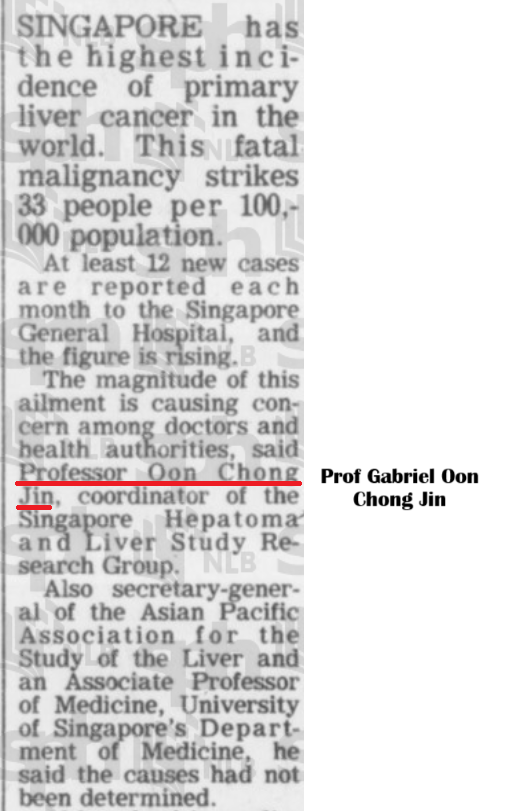Is Singapore's Healthcare System Facing a Crisis? A Special Guest Post from Singapore's Most Senior Oncologist
"My colleagues report increases in blood cancers, leukemia, relapses, as well as colon and breast cancers."
I'm excited to share a guest post by Professor Gabriel Oon, known as Singapore's most senior oncologist. His work has not only changed cancer treatment in Singapore but also influenced global practices. Professor Gabriel was key in fighting liver cancer in Singapore when it was a major health issue. As the founding President of the Singapore Society of Oncology (SSO) and the Singapore Society of Immunology and Rheumatology (SSIR), as well as the Secretary General of the Asia Pacific Association for the Study of the Liver (APASL), Professor Oon improved medical collaboration and practices in Singapore.

Before anyone in the “established” medical community labels Professor Gabriel Oon as an “antivaxxer,” it's important to highlight that he played a key role in developing the Hepatitis B vaccine. His pioneering work has been instrumental in the fight against Hepatitis B and liver cancer. In the 1970s, Hepatitis B was highly prevalent in Singapore, with a 9.1% rate among voluntary blood donors in 1975.
Liver cancer incidence in Singapore was the worst in the world.
His work with the World Health Organization helped make Singapore the first country to roll out a nationwide Hepatitis B vaccination program, leading to a significant drop in both liver cancer rates and Hepatitis B cases. Globally acknowledged, Professor Oon collaborated with Nobel Laureate Professor Baruch Blumberg, the discoverer of Hepatitis B, to enhance our knowledge of Hepatitis infections and liver cancer.
Is Singapore's Healthcare System Facing a Crisis?
For many years, Singapore thrived under the exceptional leadership of our founding father, Prime Minister Lee Kuan Yew, and his visionary team. I was one of those who returned to Singapore in March 1975, contributing under his draconian yet benevolent governance.
Today, however, we are witnessing alarming strains on our healthcare system.
In 2020, Temasek, Singapore's government investment company, invested S$330 million (US$250 million) into the German biotech company BioNTech, which was developing an experimental vaccine against the coronavirus in partnership with pharmaceutical giant Pfizer.
What exactly are these mRNA vaccines?
As a WHO consultant, I oversaw the manufacturing and use of novel hepatitis B vaccines in Singapore. These mRNA technologies were initially utilized for targeted cancer therapies and were not originally designed for mass vaccination.
The Pfizer mRNA vaccine originates from the spike portion of the SARS-CoV-2 virus, which has a USCDC patent dating back to May 2, 2004. The addition of an HIV glycoprotein has been contentious, raising suspicions about its implications.
In 2021, mandatory immunization with the Pfizer vaccine commenced, and all employees were required to comply or face dismissal. Since then, I tragically lost 34 of my senior medical staff, including my esteemed aunt and brother. My aunt was infected by a staff member who had been vaccinated with Pfizer, which subsequently led to her death. My brother, aged 86, who received the Moderna vaccine in 2021 followed by two doses of Pfizer, succumbed to COVID-19. During this period, the Delta variant, a spike-focused strain, was widespread.
By 2023, Singapore had achieved a 95% vaccination rate with Pfizer. However, this coincided with the country experiencing a concerning trend of population decline, characterized by an increase in mortality rates and a decrease in birth rates within the highly vaccinated population.
The loss of frontline healthcare staff due to COVID-19 infections in public hospitals and Changi Airport has strained the healthcare infrastructure. This led to overwhelmed emergency departments and GP clinics. To address the shortfall, 400 doctors had to be imported. Despite widespread vaccination efforts in housing board areas, concerns about mRNA vaccines persisted. Doctors who voiced these concerns faced suspensions for allegedly spreading misinformation.
Have the fatalities ceased? Unfortunately, no. Despite the removal of the Coroners Act in May 2023[source], which halted investigations into deaths related to medicines, annual mortality rates and cancer cases have continued to rise.
My colleagues report increases in blood cancers, leukemia, relapses, as well as colon and breast cancers.
Senior colleagues are either retiring or reducing their practice to cater to existing patients, while many doctors are leaving the public sector. The private sector now increasingly relies on younger doctors for replacements.
Are we witnessing the collapse of our healthcare system due to the loss of staff from COVID-19 and concerns over the safety of mRNA vaccines? This question remains critical for Singapore's future health policy and system resilience.
- Professor Gabriel Oon, 8 November 2024
Aussie17's comments: Interestingly, just a few days ago, Dr. James Royle, a prominent UK colorectal cancer surgeon, shared similar observations. It's worth asking how two professionals, who don't know each other, can notice the same phenomenon. What's the common denominator?
In my opinion, health regulators in countries like Singapore and Australia are merely mirroring the guidelines set by the FDA and CDC, as this seems to be the safest career path for the anonymous employees within their organizations. I know this firsthand because some individuals I previously hired in the pharmaceutical industry are now working with these health regulators.
However, a rude awakening is on the horizon for next year when the corruption within the FDA and CDC is exposed. This revelation will lay bare the lack of independent thought and action within our health regulatory bodies, prompting a necessary reevaluation of their roles and processes.
People will come to see that their health regulators aren't engaged in any real, independent work. Instead of genuinely assessing and addressing local health needs, they simply follow along, offering no original insight or action. This revelation will force a critical reevaluation of how public health decisions are made and highlight the need for accountability and transparency within these regulatory bodies.
I can’t wait for 2025.
Signing off for now
A17



